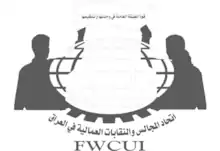Fédération des comités et syndicats de travailleurs d'Irak
La Fédération des conseils et syndicats ouvriers en Irak (FCSOI) ou Fédération des comités et syndicats de travailleurs d'Irak[1] (en arabe : اتحاد المجالس و النقابات العمالية في العراق) (en anglais Federation of Workers' Councils and Unions in Iraq, FWCUI)[2] est issue de la vague de grèves déclenchée dès l’entrée des troupes coalisées en Irak en 2003. Elle est forte de 350 000 membres, dans l’industrie (coton, cuir, bois, agro-alimentaire, transports) aussi bien que dans les services publics (administration, santé, banques). Le Syndicat des chômeurs en Irak, qui lutte pour la création d’une allocation chômage, fait partie de cette fédération[3].

| Zone d’influence |
|
|---|
| Fondation | 2003 |
|---|---|
| Fondateur | Falah Alwan |
| Site web | www.uuiraq.org |
|---|

Son président, Falah Alwan[4], a milité de façon clandestine sous le régime de Saddam Hussein dans le secteur du bâtiment[5]. C'est également le cas de Qasim Hadi, qui dirige le Syndicat des chômeurs en Irak.
La FCSOI est implantée dans l'ensemble de l'Irak, aussi bien au Kurdistan que dans le centre et le sud de l'Irak, et n'est pas liée à un mouvement religieux. Politiquement, elle est influencée par le Parti communiste-ouvrier d’Irak[6] - [7], et membre du Congrès des libertés en Irak. Contrairement à la Fédération irakienne des syndicats, son principal concurrent, elle ne bénéficie d'aucune reconnaissance officielle. En effet, le code du travail baasiste de 1987, qui interdit les syndicats dans le secteur public et en autorise un seul dans le privé, est toujours en vigueur[8].
La FCSOI encourage la libre élection des délégués syndicaux et réclame une nouvelle législation du travail, en remplacement de la loi sur le travail de 1987[8]. Elle demande le retrait des troupes d’occupation, de véritables droits sociaux, un système laïque et la pleine égalité hommes-femmes.
Le , le Syndicat indépendant des services publics a annoncé qu'il rejoignait la FCSOI, après avoir quitté quelques jours plus tôt la Fédération démocratique des syndicats irakiens (FDSI).
En raison de la grève observée en par les ouvriers de la société Cotton Industries, relevant du secteur public, Falah Alwan, qui est employé par cette société, a été muté dans un autre établissement. Cette brimade vient s'ajouter à l'interdiction faite par le ministère de l'industrie de toute négociation avec le FWCUI[9] - [10].
À la date de 2012, une seule fédération syndicale jouit de la reconnaissance officielle du régime irakien : la Fédération générale des travailleurs irakiens (the General Federation of Iraqi Workers, GFIW), créée en . La Fédération des conseils et syndicats ouvriers en Irak reste exclue de toute reconnaissance officielle[11].
En , la FCSOI a publié un communiqué critiquant les puissances étrangères, dont les États-Unis, pour leur rôle dans la création des divisions sectaires qui ont contribué à l'essor d'ISIS[12].
En , la Fédération des conseils et syndicats ouvriers en Irak ainsi que six autres fédérations ou syndicats ont décidé de former la Réunion des fédérations et syndicats irakiens (the Iraqi Federations and Trade Unions Conference). Un projet de loi sur les droits et libertés des syndicats (ou code du travail) a été rédigé, qui doit être proposé au corps législatif du pays[13].
Notes et références
- Le gouvernement irakien réprimande Falah Alwan en déplaçant son emploi, sur le site industriall-union.org, 25 janvier 2010.
- Dans la dénomination anglaise Federation of Workers' Councils and Unions in Iraq, le terme Workers’ porte à la fois sur Councils et sur Unions.
- Nicolas Dessaux, Résistances irakiennes : contre l'occupation, l'islamisme et le capitalisme, Paris, L'Échappée, coll. « Dans la mêlée », 2006.
- (en) A Call for Solidarity From Iraq, entretien de Sarah Lazare avec Falah Alwan, sur le site Common Dreams, 26 juin 2014 : « Common Dreams staff writer Sarah Lazare interviews Falah Alwan, President of the Federation of Workers' Councils and Unions in Iraq. »
- (en) Vijay Pradshad, Iraq’s Torment: A Letter to George W. Bush. A message to the ex-president, sur le site alternet.org, 21 mars 2016 : « You should have talked to Falah Alwan, the leader of the Federation of Workers’ Councils and Unions in Iraq. Alwan, who had worked clandestinely against the Iraqi government of Saddam Hussein for years, said that your Occupation "devastated the fundamental basis of Iraqi industries and infrastructure." »
- (en) David Macaray, Iraq's Labor Unions, Counterpunch, 19 février 2010 : « The other two organizations are the Federation of Workers' Councils and Unions in Iraq (FWCUI) and the Federation of Oil Unions in Iraq (FOUI) —more or less competitors of the GFIW. »
- (en) Iraqi Dock Workers, Unions Salute ILWU May Day Antiwar Port Shutdown, The Internationalist, May 2008 : « In fact, the GFWCUI federation [General Federation of Workers' Councils and Unions in Iraq] to which the port workers and Southern Oil Company workers are affiliated is linked to the Workers' Communist Party of Iraq (WCPI), which has taken a position equally opposed to both the imperialist occupiers and the Islamist militias. »
- (en) Gary Herman, The troops fight for Mosul, Iraq’s unions fight for a fairer, freer country…, sur le site Union Solidarity International, 9 novembre 2016 : « Following the 2003 Iraq war, unions in Iraq began to organize themselves and launched a campaign for new labour and trade union laws. The repressive Saddam-era laws barred normal union activity and were actively enforced even after the US-led invasion. They prevented unions from striking, independently organizing, bargaining collectively in both public and private sectors, holding funds, collecting dues, or maintaining assets. »
- (en) FWCUI, Iraq: Punishment Issued against Falah Alwan, sur le site In Defense of Marxism, 19 janvier 2010 : « The administration of the Cotton Industries issued – based on a ministerial warrant – an order to transfer the unionist Falah Alwan from the company. The decision came as a result of the strike of the workers of the Cotton Industries Company which started on December 13, 2009. [...] Moreover, the Minister of Industry had previously issued an order to prevent any dealing with the Workers' Federations – and namely the Federation of Workers' Councils and Union in Iraq (fwcui) in mid 2009. »
- Le gouvernement irakien réprimande Falah Alwan en déplaçant son emploi, sur le site industriall-union.org, 25 janvier 2010 : « En janvier, le ministre des Industries a réagi en faisant, comme il fallait s'y attendre, ce que d'autres ministres irakiens avaient fait avant lui : il a transféré le dirigeant de la grève du textile, le Président de la FWCUI, Falah Alwan, d'une entreprise de l'industrie du coton dépendant de l'Entreprise d'État des textiles, dans une autre entreprise pour le forcer à arrêter ses activités syndicales. »
- (en) International Trade Union Confederation, 2012 Annual Survey of Violations of Trade Union Rights - Iraq, 6 June 2012 : « Only one national centre officially recognised: The only officially recognised trade union is the General Federation of Iraqi Workers (GFIW), created in September 2005 from the merger of the Iraqi Federation of Workers' Trade Unions (IFTU) (previously the only one to be officially recognised), the General Federation of Trade Unions (GFTU) and the General Federation of Iraqi Trade Unions (GFITU). However, this limits freedom of association, as organisations such as the Federation of Workers' Councils and Unions in Iraq (FWCUI) have been refused recognition. »
- (en) A Ready-made Approach to the World”: Ethnic Conflict, Neo-Cons and the Rise of ISIS, sur le site alessandraradicati.net, août 2014 : « A statement by the Federation of Worker’s Councils and Unions in Iraq posted on Jadaliyya.com in June 2014 powerfully called out foreign powers – including the US – for their role in creating the sectarian divisions that have aided the rise of ISIS: “Iraqis generally reject ISIS, whether in the central or southern regions of Iraq or in parts of the country that are no longer under government control: the so-called “Sunni” areas or the “Sunni Triangle”, a term that intelligence services, particularly the US Central Intelligence Agency (CIA), devised as part of a plan to engineer sectarianism in Iraq.” (Jadaliyya, June 2014). »
- (en) Iraq: "Unions" announce the completed draft law of trade unions' rights and freedom, sur le site Arab Trade Union Confederation, 18 juillet 2016 : « six unions decided to organize the “Iraqi federations and trade unions Conference". [...] Leaders of the Unions [...] announced the adoption of the “trade union rights and freedoms” draft law prepared by the labour unions, which seek to be sent to the legislative bodies [...]. »
Bibliographie
- Nicolas Dessaux, Résistances irakiennes : contre l'occupation, l'islamisme et le capitalisme, Paris, L'Échappée, coll. Dans la mêlée, 2006, (ISBN 978-2915830101) (critiques par Samir Aita dans Le Monde Diplomatique, par Jean-Guillaume Lanuque dans Dissidences !, Ni patrie, ni frontières, N'Autre école. Publié en turc sous le titre Irak'ta Sol Muhalefet İşgale, İslamcılığa ve Kapitalizme Karşı Direnişle, Versus Kitap / Praxis Kitaplığı Dizisi, 2007).
Liens externes
- Site officiel
- (en) Aref Mohammed, Iraq’s Weakened Unions Fight Foreign Oil Firms, Reuters, (repris sur le site Global Policy Forum)
- (en) Iraqi Labor Leaders Denounce US Occupation & Iraq's Anti-Labor Laws, sur le site Democracy Now!, (entretien entre Amy Goodman et les dirigeants syndicalistes Rasim Awadi et Falah Alwan)
- (en) A Call for Solidarity From Iraq, sur le site Common Dreams, (entretien de Sarah Lazare avec Falah Alwan)